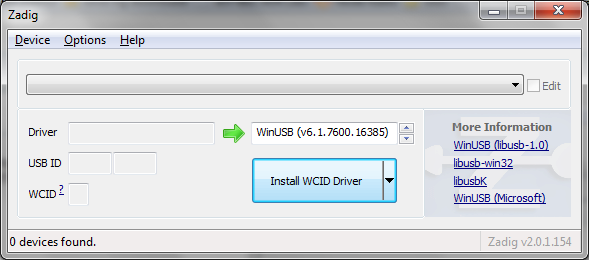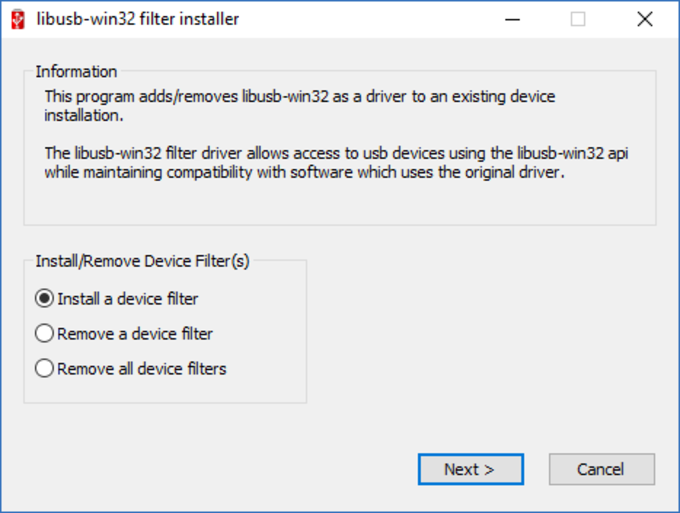Libusb 1.0 Driver Download For Windows
PyUSB module will check for libusb0.dll and libusb-1.0.dll files (which act as backends) in the PATH environment variable and in C: windows System32 locations and then establishes communication with USB devices. Since i'm using libusb-win32-wizard for creating device drivers it uses libusb0.dll. Once you have secured your access to the library and its header, please check the libusb API or the libusb samples. What happened to the old site? The old site (.org) is now obsolete, please use libusb.info. All of the current libusb development team has moved to libusb.info. For additional information, please consult the FAQ or the Wiki.
To install LibUSB on your Windows computer, follow this instructions: 1. Download latest version of LibUSB from.

%3A.jpg)

Make sure that you download a zip archive with the file name like 'libusb- win32-bin-.zip' ( stands for a number like 1.2.2.0). Otherwise you can see all files under and download the right one from there. Extract the archive to any folder of your choice. This is not a software that needs to be installed into your system. Ensure that your black PaSoRi is connected to the computer.

Start the program inf-wizard.exe in the directory bin of the extracted folder. Confirm the first screen with click on the button 'Next'.
Libusb 64 Bit Windows 10
Zadig is a Windows application that installs generic USB drivers, such as WinUSB, libusb-win32/libusb0.sys or libusbK, to help you access USB devices. Installation for Windows 8 or 10 (Continued). In the window that opens, choose libusb-win32 (v1.2.6.0) in the field to the right of the green arrow, and press the.
In the 'Device Selection' window select PaSoPi from list. If no FelicaPort or Pasori device is listed, select the USB device with Vendor-ID 0x054C and Product-ID 0x02E1 and confirm your choice with click on the button 'Next'. In the 'Device configuration' window text fields for Vendor ID and Product ID should already be filled with values from above. If not, fill in the Vendor ID = 0x054C and Product ID = 0x02E1. Let the MI text field empty. Choose some Manufacturer name, e.g.
'Sony' if not already done by wizard Choose some Device name, e.g. 'PaSoRi' or 'FelicaPort' if it is not already done by wizard.
NOTE: Wizard will later try to use the device name as a file name. So do NOT use characters that are not allowed (especially these are? ': / * ) or remove them if wizards chooses the device name automatically. If a click on 'Next' does not work, choose a simpler name without special characters.
Confirm the input by clicking on the button 'Next'. Save the.inf file in a directory of your choice. This will be the driver file for your PaSoRi. The wizard will create some additional files and folders, so we recommend to create a new folder for the driver and not to save the driver directly on your Desktop for example. 'Information' window is displayed with info about created driver files.
Start the installation of the driver by clicking the button 'Install now.' The installation process can take some moments.
Finish the installation with 'OK'. Best remo recover windows activation key free download 2016 download and torren. Now your PaSoRi is installed and you can find it in the Device manager of your system as a LibUSB-Win32 Device.
You may check the installation also by running the tool 'testlibusb- win.exe' in the folder bin x86. The information that you see should start with a text like following: DLL version: 1.2.2.0 Driver version: 1.2.2.0 bus/device idVendor/idProduct bus-0/. Libusb0- 0001--0x054c- 0x02e1 054C/02E1 - Manufacturer: Sony. Especially the DLL version and Driver version have to match and you should see 054C/02E1 in the text to verify that the driver is installed for the correct device.

Hi Folks, This is a new thread regarding elimination of the libusb dependency. To start things off, there are two options current on the table. 1) Moving to a USB/Serial implementation. 2) Moving to a HID implementation.
All are welcome to provide insights into this topic. USB is not a strong suit for me.
Any help is appreciated. One thing is for sure, elimination of the libusb dependency is an absolute. We need something that is universally supported by the various current operating systems. -- Thank you for your support and business, 73, The Multus SDR,LLC Team, Ron / W4MMP. Hey Ron, I've reviewed the source and driver files briefly, but since libusb has a long and storied history, it helps to get understanding straight from the developer. First question: Does the ExtIO DLL use the older libusb-win32 library () or the newer libusb for Windows ()? The older library is tightly bound to the decrepit libusb-0.1 API and driver, and requires the libusb0.sys kernel driver in order to function.
Today I came across a surprisingly simple approach to installing USBasp and USBtiny drivers for all versions of Windows — XP, 7, 8, 8.1, whether 32-bit or 64-bit, all inclusive! As you may know, installing open-source drivers such as USBasp and USBtiny have been a great pain on some of the recent Windows OS, due to the enforcement of signed drivers. The typical solution involves rebooting Windows into a mode that disables driver signature enforcement. Even after you’ve done it once, if you boot into the normal mode next time, it may fail to recognize the driver again (reporting it’s not digitally signed). A huge source of frustration.
Anyways, while searching for ‘fully signed USBasp driver’, I came across this tool called Zadig, which can be used to install libusb drivers on all versions of Windows, and it’s digitally signed. Since USBasp and USBtiny are both based on libusb, could it be the right solution? To my great surprise it worked really well — I was able to install both drivers on Windows XP, 7 (32-bit and 64-bit), 8, and 8.1 instantly, without messing with driver signature enforcement at all. I was mostly surprised such a great solution wasn’t documented more widely online.
Instructions
- Go to http://zadig.akeo.ie/ and download the software (note that Windows XP has a separate link).
- Plug in your USBasp or USBtiny device. In case your microcontroller uses a USBasp or USBtiny bootloader, enter bootloading mode, and let Windows detect the device (it will report driver not found). If a window pops up asking to search for driver, just close it or click on Cancel.
- At this point, run Zadig, it should detect the USBasp or USBtiny, or any libusb device that you have. Then in the selection box (see below), choose libusb-win32 (v1.2.6.0), and click on Install Driver, and wait for the installation to complete.
Libusb 1.0 Driver Download For Windows
That’s it! Because the drivers are digitally signed, there is no hassle installing it in Windows 7 64-bit and Windows 8.1.
Libusb-1.0 Windows
I will be updating the driver installation instructions for OpenSprinkler 2.1 and SquareWear right away, as they both use USBasp bootloader. Users have often complained that it’s frustrating to install USBasp driver for Windows 7 64-bit and Windows 8.1. Those days are now past!
